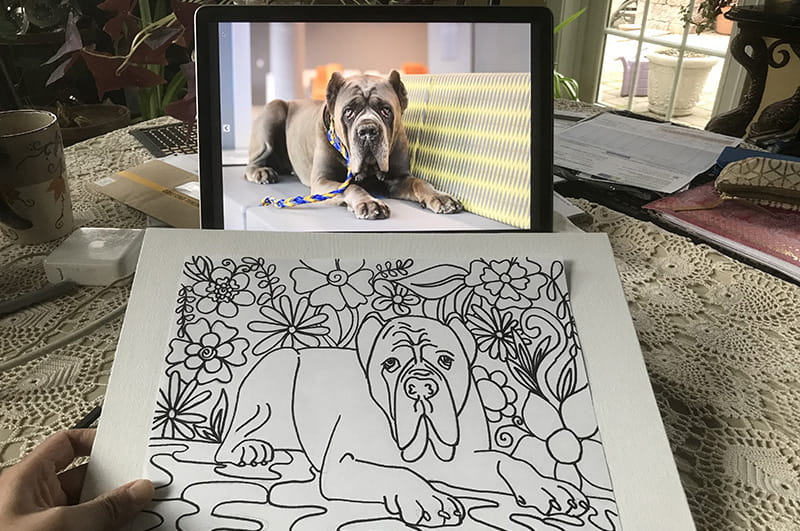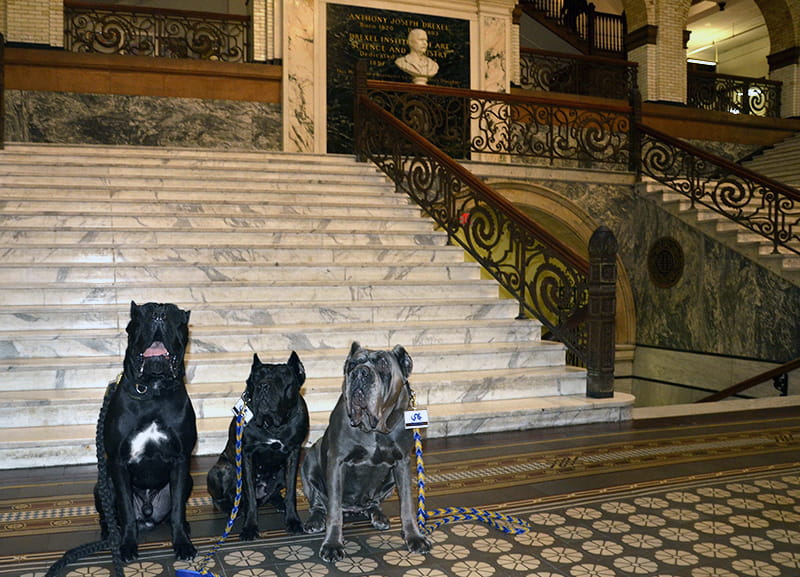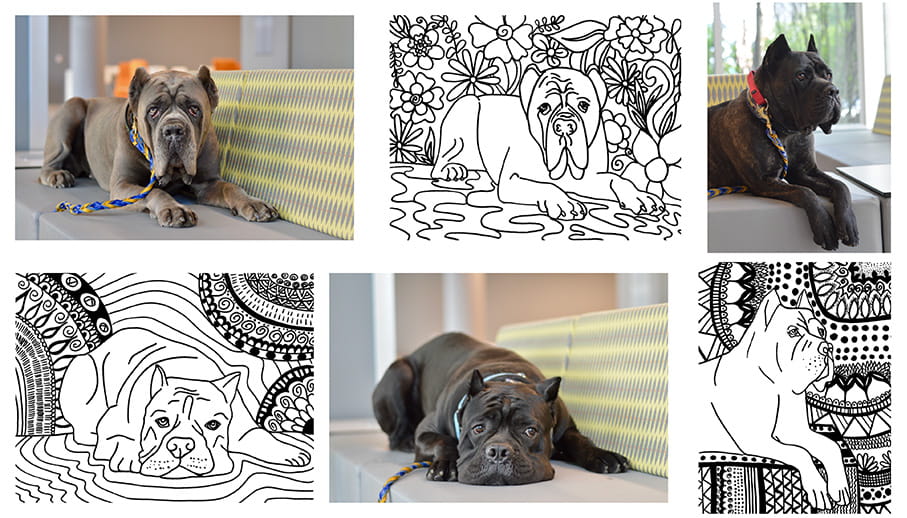Drexel Therapy Dogs Host ‘Paws’itive Art Contest

Please visit the ‘Drexel’s Response to Coronavirus’ website for the latest public health advisories.
Like many Dragons this quarter, Drexel University’s three therapy dogs — Chai, Espresso and Java — miss being on campus and hanging out with their friends.
“They are loving having us home all the time and being there to train, snuggle and play with them, but they miss everybody,” said Janine Erato, the dogs’ owner, about sheltering in place with the dogs and her family. “Being at home compared to being with all the people on campus — I mean, as much as they love us, it just isn’t the same.”
Erato knows that Drexel students, faculty and staff miss seeing their furry friends too. And she worries that those Dragons are still experiencing the same stresses from before the COVID-19 pandemic, but now are dealing with additional and heightened insecurities, worries, fear, uncertainties and grief caused by novel coronavirus. Only now, they can’t relax and snuggle with the three Cane Corsos that Erato regularly brought to the University’s three campuses for special events, free walks and open hours on campus, and scheduled visits with organizations and departments.
“Everyone’s experiences during and after the pandemic may look incredibly different, and we are here to continue showing support with everything they are facing,” said Erato. “We want people to know that the dogs are still there for them, whether we’re on campus or not. We’re still available for Drexel staff and students to be engaged with the dogs, but it’s just going to be done a little differently.”

That’s why she and her intern, College of Arts and Sciences biological sciences major Mallika Kodavatiganti, have organized the Drexel Therapy Dogs “Paws”itive Art Contest this quarter; fellow biological sciences majors Erin Poole and Ryan Krawczyk will come on board at the end of the month as additional interns.
Mixing art therapy with (virtual) pet therapy, the contest runs until June 6 and is open to all students, faculty and professional staff who want to create art of one, or two, or three of the dogs.
The rules are as follows:
1. Artwork must be original work of student/faculty/professional staff.
2. Artwork must include at least one of Drexel’s therapy dogs.
3. Artwork submission is limited to one entry per Dragon.
4. Artwork must be submitted in .jpg or .png format to drexeltherapydogs@drexel.edu.
5. Art can be created with any of the following mediums: drawing and painting (i.e., pencil, charcoal, pastels, colored pencils, oil paints, acrylics, water media, mixed media/collage) and original digital creations.
6. The artwork will be judged on the following criteria: creativity, originality, scale, and techniques used.
7. When submitting your art, you must include the following information: name, staff or student, medium used, contact information.
8. Media release: by submitting your original artwork you are agreeing to us displaying and utilizing your artwork.
Prizes will be awarded, including $25 for first place. Entries will be judged by an independent art teacher, and the winners will be announced at the end of June.
The art contest is just one of the ways that Erato and her team have been virtually engaging with Dragons this quarter. They’ve signed into a Zoom meeting for an organization, where Dragons watched the dogs play at home, and are open to doing that more. But by far and wide, the best ways for Dragons to keep up with the therapy dogs at home would be to follow the dogs’ popular Facebook, Instagram, Twitter and Snapchat (username: chaiatdrexel) accounts. On those social media channels, lots of behind-the-scenes videos and photos are being shared of the dogs training, playing and even bathing at home.
Those channels also engaged Dragons with little challenges Erato devised to bring about some levity and connectedness. One was a “sit and stay” pet challenge for Dragons to take videos of themselves circling around their seated dogs, and another was a photo caption challenge, in which Dragons could share their creative captions to a photo of Espresso running in the grass.

The idea of the art contest came about because Erato and her team wanted to share dog coloring pages, but the ones they found online were really complex and just not what they wanted. Kodavatiganti originally suggested making coloring pages of the dogs for people to download, but the idea grew to further engage Dragons by having them create their own art of the dogs, in whatever way they wanted it.
“We just thought there are so many wonderfully talented staff and students on campus, so why wouldn’t we utilize their talents and have them create their own art?” Erarto said, adding that she’s wanted to make a calendar showing off the dogs for a while now, and has already created magnets of the dogs to give to Dragons.
Once the campus opens up, the art could be displayed at the Drexel Recreation Center. But until that happens, Erato and her team will continue sharing photos and videos of the dogs and engaging with their fans. And the three generations of Drexel therapy dogs — eight-year-old grandmother Chai, five-year-old mom Espresso and her two-year-old son Java will still be playing, (safely) going for walks and training at home.
“Training that normally only happens once or twice a week now sometimes is happening twice a day,” said Erato. “It looks different every time, but in the morning we could go for a walk and then in the afternoon we’re running through agility. Java’s learning how to do agility jumps and the girls are learning weave pulls, which are really good to strengthen their core, which they need because they’re getting older.”
It’s been just over four years since Erato and Chai started working at Drexel, and since then the size and scope of the therapy dogs team and their time on campus — and, also, their fanbase — has greatly expanded. And Erato wants everyone to know that there’s no plan to stop what they’ve been doing.
“We want to come back stronger and better than ever and just really be there for everybody transitioning back to life on campus,” she said. “We feel that this year, not only for freshmen coming in but students returning after months of being quarantined, it’s going to be all hands on deck and the more support, the better. And we really want to make sure that we are there to address those needs then — and also now, before that can happen.”
In This Article
Drexel News is produced by
University Marketing and Communications.

